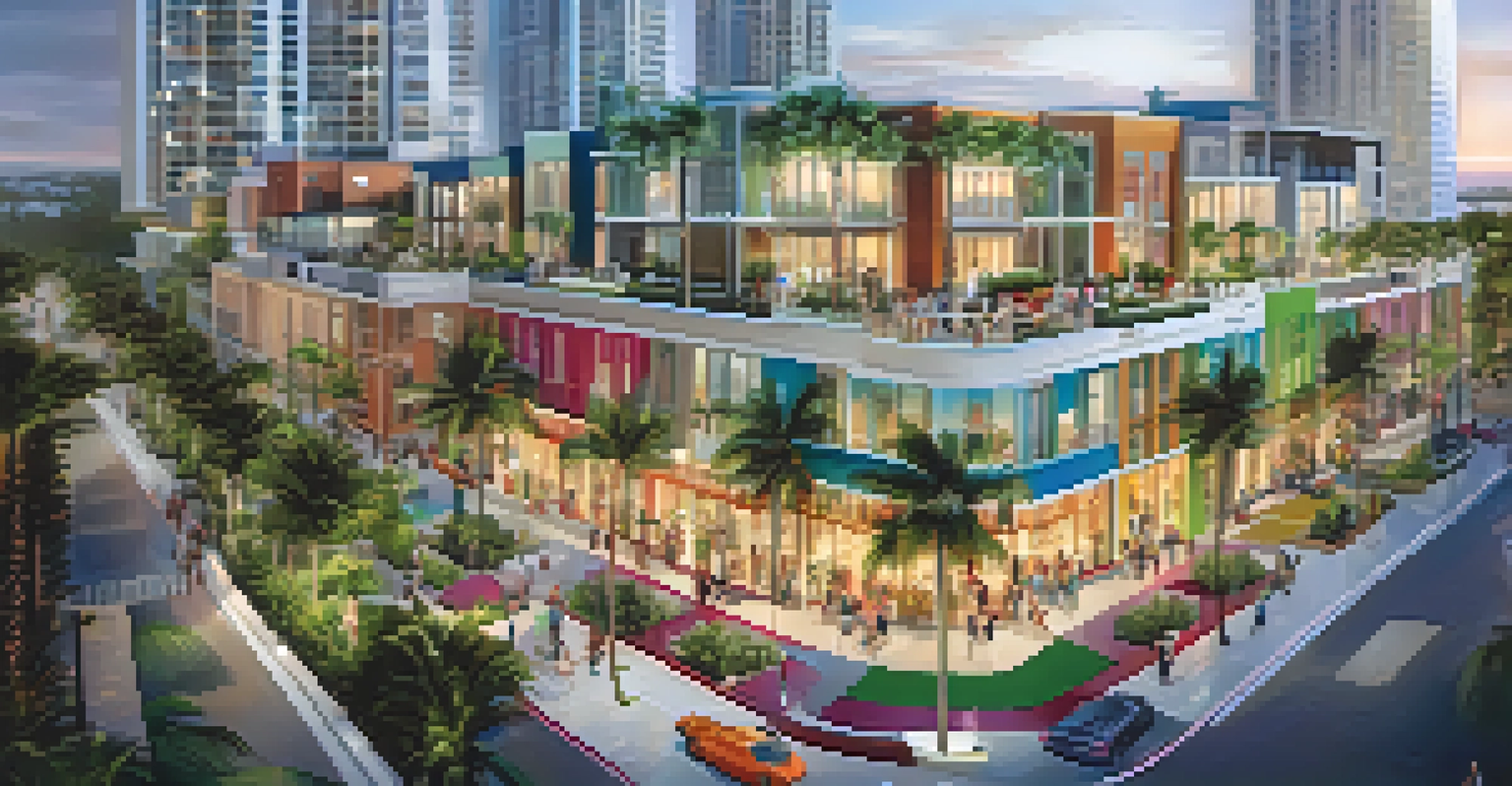Commercial Real Estate in Miami: Opportunities and Risks

Miami's Booming Commercial Real Estate Landscape
Miami has become a hotspot for commercial real estate, attracting investors from all over. With its vibrant economy and diverse culture, the city offers a unique blend of opportunities for businesses. The influx of new residents and tourists fuels demand for various commercial properties, from retail to office spaces.
Real estate is not just about property; it's about the people who live, work, and play in it.
In recent years, Miami's commercial real estate market has seen significant growth, driven by factors like its strategic location and favorable tax environment. The city serves as a gateway to Latin America, making it an attractive option for international businesses. This dynamic environment creates a wealth of opportunities for savvy investors.
However, navigating this booming market requires careful consideration of various factors, including market trends and local regulations. Understanding the nuances of Miami's commercial real estate landscape can lead to lucrative investments and long-term success.
Key Opportunities in Miami's Commercial Real Estate
One of the most promising opportunities in Miami's commercial real estate market is the surge in demand for mixed-use developments. These properties combine residential, retail, and office spaces, catering to the growing trend of urban living. Investors can capitalize on this trend by focusing on areas with high foot traffic and accessibility.

Additionally, the hospitality sector continues to thrive, thanks to Miami's status as a tourist destination. Hotels, resorts, and short-term rental properties remain attractive investments, offering high returns during peak seasons. With event venues and attractions nearby, properties in these categories often see consistent occupancy rates.
Miami's Real Estate is Thriving
The city's booming commercial real estate market attracts diverse investors due to its vibrant economy and strategic location.
Finally, the rise of remote work has led to an increased demand for flexible office spaces. Co-working spaces and shared offices are becoming popular, especially among startups and freelancers. This shift presents an opportunity for investors to create innovative work environments that cater to this growing market.
Understanding the Risks Involved in Commercial Real Estate
While Miami's commercial real estate market is thriving, it's essential to be aware of the risks involved. Economic fluctuations can impact property values and rental income, making it crucial for investors to stay informed about market trends. A sudden downturn could leave investors vulnerable if they are not prepared.
In the world of real estate, your best investment is always in knowledge.
Another risk factor is the potential for overdevelopment. As more investors flock to Miami, there is a chance that the market may become saturated, leading to increased competition and lower returns. Identifying the right properties and understanding the local demand is vital to mitigate this risk.
Moreover, natural disasters pose a significant risk in Miami, particularly hurricanes and flooding. Investors must consider insurance costs and the potential for property damage when evaluating their investments. Understanding local environmental risks will help investors make informed decisions regarding their property portfolios.
Regulatory Considerations for Investors
Navigating the regulatory landscape is critical for anyone looking to invest in Miami's commercial real estate. Local zoning laws and building codes can significantly impact development opportunities. Investors need to familiarize themselves with these regulations to avoid potential legal issues and ensure compliance.
Additionally, Miami's ongoing efforts to improve infrastructure and public services can influence commercial real estate investments. Projects aimed at enhancing transportation, utilities, and public spaces can increase property values and attract more businesses. Staying updated on these developments can provide a competitive edge.
Mixed-Use Developments are Key
Investors can capitalize on the growing demand for mixed-use properties that combine residential, retail, and office spaces.
Finally, understanding the tax implications of commercial real estate investments in Miami is crucial. Florida's favorable tax environment can benefit investors, but being aware of property taxes and potential incentives is essential. Proper tax planning can enhance investment returns and minimize financial risks.
The Role of Financing in Real Estate Investments
Financing plays a significant role in commercial real estate investments, especially in a competitive market like Miami. Investors must explore various financing options, from traditional mortgages to alternative sources like crowdfunding. Understanding the pros and cons of each option can help investors choose the best path for their projects.
Moreover, securing financing often requires a solid business plan and financial projections. Lenders want to see a clear strategy and the potential for return on investment. This means that investors must be prepared to present a compelling case for their properties to access the necessary funds.
Lastly, interest rates can significantly impact financing decisions. As rates fluctuate, investors should be agile and ready to adapt their strategies accordingly. Keeping an eye on market conditions and economic indicators will help investors make informed financing choices.
Market Trends Shaping Miami's Commercial Real Estate
Understanding market trends is vital for anyone looking to invest in Miami's commercial real estate. The shift towards sustainability has gained momentum, with many businesses seeking eco-friendly spaces. Investors can capitalize on this trend by developing green buildings or renovating existing properties to meet sustainability standards.
Another trend is the increasing demand for technology-driven properties. As businesses rely more on technology, properties equipped with modern amenities and infrastructure are becoming more desirable. Investors who prioritize tech-friendly designs can attract a broader range of tenants and improve their property's appeal.
Stay Informed on Market Risks
Navigating Miami's commercial real estate requires awareness of risks such as economic fluctuations, overdevelopment, and natural disasters.
Lastly, the evolving preferences of consumers and businesses also shape the market. A growing emphasis on experiences over material goods leads to a demand for experiential retail spaces and community-focused developments. Understanding these changing preferences will help investors make informed decisions about their property acquisitions.
The Future of Commercial Real Estate in Miami
Looking ahead, the future of commercial real estate in Miami appears promising, with continued growth and development on the horizon. As the city evolves, new opportunities will likely emerge, particularly in emerging neighborhoods. Investors willing to explore these areas can find hidden gems with high growth potential.
Additionally, ongoing infrastructure improvements and urban renewal projects will enhance Miami's appeal to businesses and residents alike. Areas previously overlooked may become prime locations for commercial investments as amenities and accessibility improve. Staying informed about these developments is essential for successful investing.

Ultimately, success in Miami's commercial real estate market will require adaptability and a willingness to embrace change. Those who remain agile and responsive to shifting market dynamics will be best positioned to take advantage of the opportunities that lie ahead.